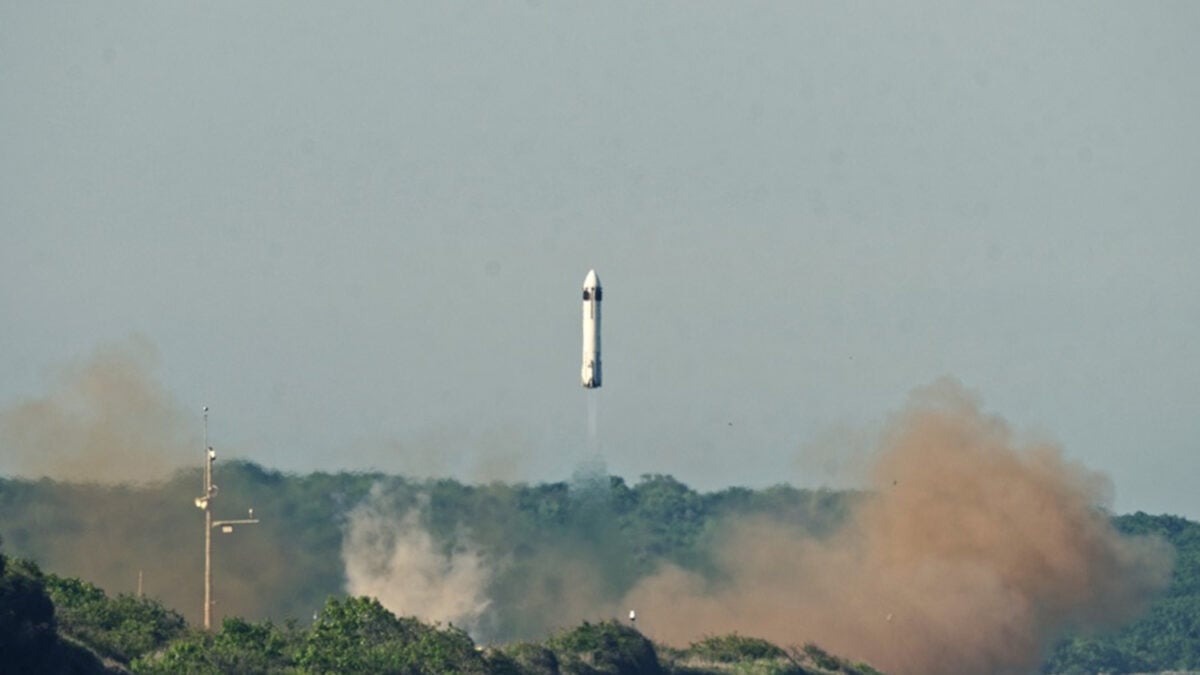In a bizarre twist, Honda, the Japanese car manufacturer, has taken its engineering off-road—and into space. The company launched and landed a prototype reusable rocket on Tuesday, June 17, marking a key milestone toward its newfound goal of achieving suborbital spaceflight by 2029.
In the surpriseannouncement, Honda R&D—the company’s research arm—said it successfully completed the first launch and landing test of its 20.6-foot (6.3-meter) experimental reusable launch vehicle after reaching an altitude of 889 feet (271 meters) at its test facility in Taiki, a town in northern Japan known for space research. The test aimed to demonstrate technologies essential for rocket reusability, such as flight stability during ascent and descent, as well as landing capability, according to the company statement.
“Although Honda rocket research is still in the fundamental research phase, and no decisions have been made regarding commercialization of these rocket technologies, Honda will continue making progress in the fundamental research with a technology development goal of realizing technological capability to enable a suborbital launch by 2029,” the statement reads.
Honda firstannouncedtentative plans to build a small reusable rocket in September 2021 as part of an initiative to break into space technologies. In late 2024, the company established the Space Development Division at American Honda to promote technology development in the U.S. and enhance collaboration with the U.S. space industry.
Since then, Honda has been actively involved in the development of spaceflight-related tools. In April, the manufacturerannouncedplans to test an electrolysis system on the International Space Station (ISS) and build a regenerative fuel cell system to support life in space and on Earth. In May, Hondapartneredwith private spaceflight company Astroscale Japan Inc. to develop a system for in-orbit satellite refueling.
Still, the company has kept its spaceflight progress relatively quiet over the last several years, and did not publicly disclose launch test details for its reusable rocket, which is why today’s announcement came as such a surprise. Honda is not the only car manufacturer clamoring to enter the commercial space race. Earlier this year, Toyota announced that its research arm invested in the Taiki-based spaceflight company Interstellar Technologies to support mass production of launch vehicles, Reutersreports
Japan’s government has set an ambitious goal of doubling its space industry’s size to 8 trillion yen ($55.20 billion) by the early 2030s, according to Reuters. To get there, it has established a multibillion-dollar space venture to subsidize private rockets, satellites, and other missions.
Today’s launch and landing success sets an optimistic tone for Honda’s burgeoning space program. “We are pleased that Honda has made another step forward in our research on reusable rockets with this successful completion of a launch and landing test,” Global CEO Toshihiro Mibe said in the announcement. “We believe that rocket research is a meaningful endeavor that leverages Honda’s technological strengths.”
Get the best tech, science, and culture news in your inbox daily.
News from the future, delivered to your present.
Please select your desired newsletters and submit your email to upgrade your inbox.
The Resilience lander was carrying a tiny rover, a miniature Swedish cottage, and several science payloads when it crashed onto the lunar surface.
A surprise solar storm also came with a baffling phenomenon that left people in the inland U.S. scratching their heads.
The failure resulted in the loss of a Lockheed Martin technology demonstration satellite.
After splashdown, the crew will attempt to exit the vehicle without assistance to assess their physical capabilities.
A routine test turned into a surprise discovery when DARPA’s atmospheric sensors picked up something unexpected—courtesy of a falling SpaceX Falcon 9.
The Fram2 mission is set for launch on Monday at 9:46 p.m. ET.



 Motivational
Motivational 22 Jul, 2025
22 Jul, 2025 George Ward
George Ward